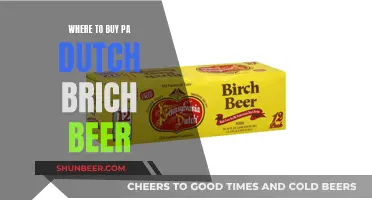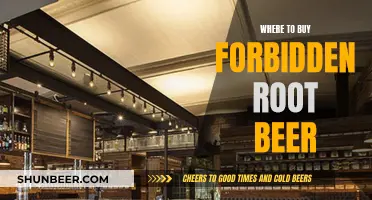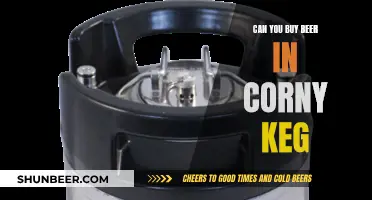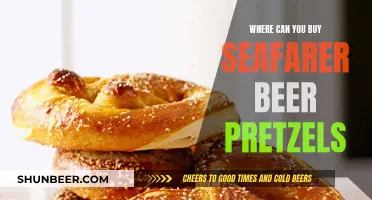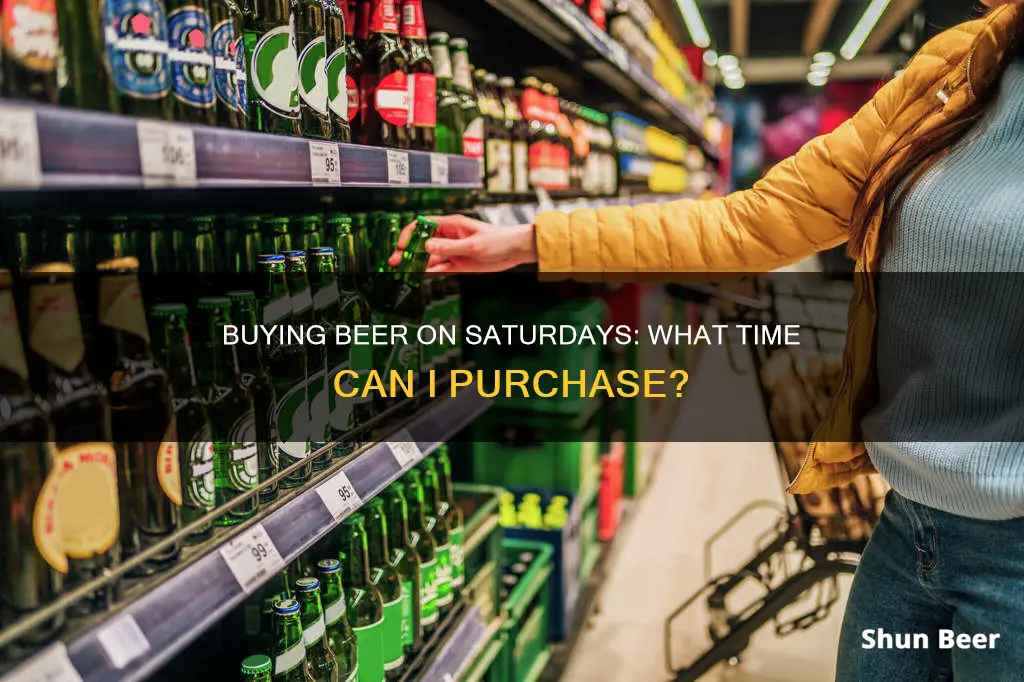
The sale of alcohol is tightly regulated in the United States, with individual states and even local jurisdictions having significant differences in their liquor laws. For example, in Texas, beer can be purchased in grocery and convenience stores from 7 a.m. to midnight Monday to Friday, 7 a.m. to 1 a.m. on Saturday, and from noon to midnight on Sunday. However, in Arizona, beer can be purchased from 6 a.m. to 2 a.m. Monday to Saturday and 10 a.m. to 2 a.m. on Sunday. These laws vary widely and are subject to change, so it's important to check the specific regulations in your state and locality.
| Characteristics | Values |
|---|---|
| State | Texas |
| Day | Saturday |
| Time | 7:00 a.m. to 1:00 a.m. (or 2:00 a.m. with a late hours permit) |
| Location | On-premise (e.g. bar, restaurant) or off-premise (e.g. grocery, convenience store) |
| Exceptions | Some counties are entirely dry, and several permit the sale of beer and wine but not liquor |
What You'll Learn

State-specific laws
The time at which beer can be purchased varies across the United States. Here is a state-specific lowdown on when you can buy beer on a Saturday:
Alabama
Beer and wine are not controlled by the state, but spirits are. Beer and wine can be sold in supermarkets, but spirits cannot. On- and off-premise liquor sales are limited to 2 am on Sundays. Alcohol can be served 24 hours a day unless restricted by local ordinances. 26 of Alabama's 67 counties do not allow alcohol sales, but possession and consumption are still legal.
Alaska
No alcohol is state-controlled in Alaska. On- and off-premise sales are allowed from 8 am to 5 am every day of the week. Liquor sales are not permitted in grocery stores.
Arizona
No alcohol is state-controlled in Arizona. Sales are permitted from 6 am to 2 am Monday to Saturday, and 10 am to 2 am on Sundays. Drive-through liquor stores are legal.
Arkansas
Distribution is not state-controlled. On-premise sales are allowed from 7 am to 2 am, and off-premise sales are allowed from 7 am to 1 am Monday to Friday, but only until midnight on Saturdays. Beer and wine can be sold in supermarkets, but only in-state-produced wine is allowed, and spirits are prohibited. Sunday and Christmas Day sales are prohibited.
California
Sales are not controlled by the state. Sales are allowed from 6 am to 2 am every day of the year. Wine, beer, and spirits can be sold in grocery stores. California has lenient laws about liquor promotion, but counties can restrict sales with local laws.
Colorado
Sales are not controlled by the state. On-premise sales are allowed from 7 am to 2 am, and off-premise sales from 8 am to midnight. Only 3.2% ABV beer can be sold in grocery stores. Off-premise sales are allowed seven days a week.
Connecticut
Sales are not controlled by the state. On-premise sales are allowed from 9 am to 1 am Monday to Thursday, and 9 am to 2 am Friday and Saturday. Off-premise sales are allowed from 8 am to 9 pm Monday to Saturday. Off-premise sales are not allowed on Sundays or holidays. Beer can be sold in grocery stores.
Delaware
Sales are not controlled by the state. On-premise sales are allowed from 9 am to 1 am, and off-premise sales from 9 am to 1 am Monday to Saturday, and noon to 8 pm on Sundays, subject to local ordinances. Holiday sales are not allowed, nor is off-premise sales outside of a licensed liquor store, taproom, or brewpub.
Florida
Sales are not controlled by the state. State law prohibits on- and off-premise sales between 1 am and 7 am, unless the county decides to change the operating hours. For example, in Miami-Dade County, liquor stores may operate 24 hours a day. Beer, wine, and low-alcohol liquors can be purchased at grocery stores.
Georgia
Sales are not controlled by the state, and hours of sale are determined by the county. No off-premise sales are allowed on Sundays. Certain areas allow public consumption with the following limitations: one drink on the street, with a maximum size of 16 oz, and drinking from a can, bottle, or glass is prohibited.
Hawaii
Sales are not controlled by the state. On-premise sales are allowed from 11:50 am to 6 am with the proper cabaret licensing. Off-premise sales are allowed from 11:50 am to 12 am. Spirits, beer, and wine can be sold in grocery stores.
Idaho
Spirit sales are controlled by the state. On-premise sales are allowed from 10 am to 1 am. Beer and wine can be sold in grocery stores. Beverages exceeding 16% ABV can only be sold in state dispensaries or contracted stores.
Illinois
Sales are not state-controlled. On-premise sales are allowed from 6 am to 4 am. All beverages can be sold in grocery stores. Sales laws are determined by local municipalities. Sales on Sundays are not allowed until 11 am.
Indiana
Sales are not controlled by the state. On-premise sales are allowed from 7 am to 3 am Monday to Saturday, and 10:30 am to 12:30 am on Sundays. Off-premise sales are allowed from 7 am to 3 am, but not on Sundays. No sales are allowed on Christmas, New Year's Day, or election day before the polls close. Alcohol can be sold in supermarkets.
Iowa
Spirit sales are controlled by the state. On- and off-premise sales are allowed from 6 am to 2 am Monday to Saturday, and 8 am to 2 am on Sundays. Grocery store alcohol sales are permitted. All beer greater than 6% ABV must be shipped from the state warehouse.
Kansas
The state does not control liquor distribution, but it has some of the strictest laws in the nation. All alcohol was prohibited from 1881 to 1948, and on-premise sales were prohibited from 1881 to 1987. Sunday sales have only been allowed since 2005. In counties that allow on-premise sales, it is permitted from 9 am to 2 am, and off-premise sales from 9 am to 11 pm Monday to Saturday, and noon to 7 or 8 pm on Sundays. Sales are prohibited on Memorial Day, Labor Day, Independence Day, Thanksgiving, Christmas, and Easter. Only 3.2% ABV beer is available at grocery stores.
Kentucky
Sale is not state-controlled. On-premise sales are allowed from 6 am to 4 am, and off-premise sales from 6 am to 2 pm. Alcohol can be sold in grocery stores. All ordinances are subject to local laws, and only Louisville allows on-premise sales from 2 to 4 am. Since 2005, Sunday sales have been allowed, but this can be overruled locally. 53 counties are completely dry, where even possession is illegal. 16 counties have some cities that allow sales. Another 21 counties only allow speciality sales, such as wine from wineries. There are only 5 counties around the major cities that fully allow sales.
Louisiana
Sales are not state-controlled. There are no restrictions on on- or off-premise sales unless the municipality decides that on-premise sales must stop at 2 pm. Off-premise sales are allowed in grocery stores and all other licensed stores. These sales can be 24/7, and no municipality can challenge this. In New Orleans, you can drink alcohol in public, and in some places, you can take your drinks from one bar to another.
Maine
Spirits sales are controlled by the state. On-premise sales are allowed from 6 am to 1 am Monday to Saturday, and 9 am to 1 am on Sundays. Beer and wine can be bought in grocery stores. Wine with ABV > 15.5% must be sold in state-contracted stores. Alcohol sales are not permitted after 1 am any day.
Maryland
Laws in Maryland vary by locality, and sales are not state-controlled. Some counties prohibit sales on Sundays, while others do not. Some places restrict alcohol heavily, but there are no completely dry counties. Some alcohol is allowed to be sold in grocery stores in some counties.
Massachusetts
Distribution is not state-controlled. On-premise sales are allowed from 8 am to 1 am (2 am in Boston). Off-premise sales are allowed from 8 am to 11 pm. Sunday sales on- and off-premise start at noon. Cities have the authority to shorten these times. Some convenience stores are licensed to sell beer, but not grocery stores or gas stations. Happy hours are prohibited, and you can only purchase two drinks per individual at one time on-premise.
Michigan
Spirits sales are controlled by the state. On- and off-premise sales are allowed from 7 am to 2 am, and noon to 2 am on Sundays. Any liquor can be sold at grocery stores and convenience stores, except gas stations in Wayne County. Sales of liquor after 9 pm on December 24 and all of Christmas Day are prohibited. On-premise sales on January 1 are allowed until 4 am.
Minnesota
The state does not control sales. On-premise sales are allowed from 8 am to 2 am. Off-premise sales are allowed from 8 am to 10 pm, and there are no off-sales on Sundays. Local ordinances can change off-sale hour allowances, and growler sales are allowed until 10 pm.
Mississippi
Spirits distribution is controlled by the state, and sales hours are fixed by local municipalities. Beer can be sold in grocery stores, but wine > 6% ABV can only be sold in state-controlled stores. Sales are prohibited on Christmas Day, but there is no open container law in the state. You can get free alcohol 24/7 in the coastal casinos. In most counties, Sunday sales are prohibited, and there are even some dry counties.
Missouri
Missouri has very permissive alcohol laws. Alcohol is not state-controlled. On-premise sales are allowed from 6 am to 1:30 am Monday to Saturday, and 9 am to 12 am on Sundays. St. Louis and Kansas City, and a few other counties can operate from 6 am to 3 am daily. Off-premise sales are allowed from the same times, and bars can double as liquor stores in St. Louis and Kansas City, which can remain open until 3 am. There are no state open container laws, no blue laws, no public intoxication laws, and absinthe is not prohibited. There are no dry counties, and prohibiting off-premise sales is illegal. State laws preempt local laws. Grocery stores and gas stations can sell liquor, with the only limitation being operating hours. Parents and guardians may give their children alcohol. There is no prohibition of consumption by minors, though purchase, possession, and intoxication by minors is illegal. Open containers are allowed on Kansas City's Power and Light District. You may manufacture up to 100 gallons of liquor for personal use without state permits or taxes.
Montana
Spirits are regulated by the state, though beer and wine may be sold at grocery stores, as long as it is <16% ABV. Above that, wine must be sold at state-controlled stores. On-premise sales are limited to 2 am.
Nebraska
Sales are not controlled by the state. On- and off-premise sales are allowed from 6 am to 1 am, though you cannot purchase hard liquor on Sundays before noon. Omaha has repealed the Sunday hard alcohol law. All alcohol can be purchased in grocery stores.
Nevada
The state does not control distribution, and there are very few laws except regarding the age of purchase. Stores can be open 24 hours a day, and liquor can be sold in grocery and convenience stores. Public intoxication is legal, and local laws cannot be made to change this.
New Hampshire
Spirit sales are controlled by the state. On-premise sales are allowed from 6 am to 1 am, and off-premise sales until 11:45 pm. Beer can be sold in grocery stores, but there is a 12% ABV cap for beer sold anywhere in the state. Liquor is sold in state-run stores, often located along highway rest areas.
New Jersey
Sales are not controlled by the state. Hours of sale are regulated by each municipality. Beer and wine can occasionally be sold in grocery stores. There are some dry counties, particularly in the southern part of the state.
New Mexico
Sales are not state-controlled. On-premise sales are allowed from 7 am to 2 am, and off-premise sales until midnight, except on Sundays, when no sales are permitted on or off-sale. Stores can apply for on- and off-premise licenses to allow for Sunday sales if their municipality allows it, but sales on Christmas are never permitted. Alcohol can be sold in grocery stores. Parents, legal guardians, and adult spouses are allowed to give minors alcohol within private property under their control.
New York
Sales are not controlled by the state. On-premise sales are allowed from 8 am to 4 am. Off-premise beer is always available except from 3 to 8 am on Sundays. Wine and spirits can be purchased from 9 am to midnight Monday to Saturday, and noon to 9 pm on Sundays. Beer can only be sold in supermarkets, and wine and spirits can only be purchased at liquor stores.
North Carolina
Spirits are controlled by the state. On-premise sales are allowed at any time except from 2 am to 7 am Monday to Saturday, and 2 am to noon on Sundays. Beer and wine can be sold in supermarkets, but only state-run stores can sell liquor, with hours of Monday to Saturday, 11 am to 9 pm. There is a 15% ABV limit on beer.
North Dakota
Sales are not controlled by the state. On-premise sales are allowed from 8 am to 2 am Monday to Saturday, and noon to 2 am on Sundays. Off-premise sales are allowed until 2 am. Sales are limited on Thanksgiving, Christmas, and Christmas Eve.
Ohio
Spirit sales are controlled by the state. On-premise sales are allowed from 5:30 am to 2:30 am, and off-premise sales from 5:30 am to 1 am. Grocery stores can sell all forms of alcohol. The state licenses private businesses for a fee. There is a 12% ABV limit on beer.
Oklahoma
Sales are not controlled by the state. On-premise sales are allowed from 6 am to 2 am, and off-premise sales from 10 am to 9 pm. Only 3.2% beer can be sold in supermarkets, and any beer over 4% can only be sold at room temperature in liquor stores, which are closed on Sundays and some holidays. As of 2007, stores are open on election days.
Oregon
Spirit sales are controlled by the state. On- and off-premise sales are allowed from 7 am to 2:30 am, and beer and wine can be sold at supermarkets. Liquor is only available at state-run liquor stores.
Pennsylvania
Wine and spirits sales are controlled by the state. On-premise sales are allowed from 7 am to 2 am Monday to Saturday, and 11 am to 2 am on Sundays, with a special permit. Wine and spirits can only be purchased at state-run liquor stores, which operate from 9 am to 10 pm Monday to Saturday, and noon to 5 pm on Sundays. Liquor permits for events appear to be complex and limited.
Rhode Island
Sales are not controlled by the state. On-premise sales are allowed until 2 am, and off-premise sales from 9 am to 10 pm Monday to Saturday, and noon to 6 pm on Sundays. Alcohol can only be sold in liquor stores.
South Carolina
Sales are not controlled by the state. On-premise sales hours are controlled locally and vary. Beer and low-alcohol wine can be sold 24 hours a day, and liquor can be sold from 9 am to 7 pm Monday to Saturday at liquor stores. There is a 17.5% ABV cap on beer and 16% on wine. No liquor sales are allowed on election day.
South Dakota
Sales are not controlled by the state. Sales of alcohol are allowed in supermarkets. There is a 14% ABV limit on beer.
Tennessee
Sales are not controlled by the state. On-premise sales are allowed from 8 am to 3 am Monday to Saturday, and 10 am to 3 am on Sundays. Off-premise sales are allowed from 8 am to 11 pm, except on Sundays. Beer can be sold in supermarkets, and interestingly, open container laws only apply to the driver of a vehicle, not their passengers.
Texas
State liquor laws vary. Grocery and convenience stores can sell beer and wine from 7 am to midnight Monday to Friday. On Saturdays, sales begin at 7 am and extend until 1 am on Sunday mornings. In 2021, Texas updated its laws regarding Sunday sales, moving the start time from noon to 10 am. Liquor stores operate from 10 am to 9 pm, Monday through Saturday. They are closed on Sundays, Thanksgiving, Christmas, and New Year's Day. If Christmas or New Year's falls on a Sunday, they remain closed on Monday.
Utah
Sales are controlled by the state. On-premise sales of liquor are allowed by restaurants from noon to midnight, and beer from 10 am to 1 am. Private clubs can serve liquor the same hours as beer for restaurants. Off-premise sales vary but are all state-run and close no later than 10 pm, and are not open on Sundays. 3.2% ABV beer can be sold in supermarkets. Restaurants and clubs must buy alcohol from state-run stores at retail price, and no alcohol can be served without food. Only 3.2% ABV beer can be on tap, and keg sales are banned. Alcohol cannot be served on election day until after 8 pm.
Vermont
Spirit sales are controlled by the state. On-premise sales are allowed from 8 am to 2 am, and off-premise sales from 6 am to midnight. Beer <8% ABV and wine <16% can be sold in supermarkets. Liquor is only available at state-run stores.
Virginia
Spirits are controlled by the state. On-premise sales are allowed from 6 am to 2 am, with no restrictions for licensed clubs. Off-premise sales are allowed from 6 am to midnight. Beer and wine can be sold in supermarkets. Liquor and wine >14% ABV can only be sold in state liquor stores. Sunday sales are prohibited in some counties.
Washington
Drakes' Beer Selection: Take-Home Options Available
You may want to see also

Online orders
Texas's complex liquor laws can make it tricky to know when you can buy beer, especially when ordering online. Here is a detailed guide to help you navigate online beer orders in Texas on a Saturday:
Online Beer Orders in Texas on a Saturday:
- Retailers: Online beer orders from retailers such as convenience stores and grocery stores are typically available on Saturdays. These stores offer extended hours for beer sales, usually from 7 a.m. to 1 a.m. on Sundays. This means you can place your order anytime during this window.
- Liquor Stores: Texas liquor stores are not allowed to operate on Sundays, but they can sell beer on Saturdays from 10 a.m. to 9 p.m. So, if you're ordering beer online from a liquor store, make sure to place your order within this timeframe.
- Bars and Restaurants: While bars and restaurants serve alcohol on-premises, they follow similar hours to retailers for beer sales. They can sell beer from 7 a.m. on Saturday until 1 a.m. on Sunday. Therefore, you can place your online order within this period.
- Wineries: Wineries in Texas are allowed to operate from 8 a.m. to midnight on Saturdays. If you're ordering beer from a winery, ensure your order is placed within their operating hours.
- Delivery Services: Some delivery services, such as Craftshack, offer online beer orders. These services often provide speedy delivery, but it's essential to check their specific operating hours, as they may vary.
- Alcohol To-Go: Due to the COVID-19 pandemic, Texas has permanently allowed alcohol to-go sales. This means you can place online orders for beer with food orders from establishments holding mixed beverage and private club permits.
- Age Restriction: It's important to remember that you must be 21 years old or older to purchase beer in Texas. Online retailers will likely require proof of age upon delivery.
- Location-Specific Laws: Keep in mind that some counties or municipalities in Texas may have additional laws regulating alcohol sales. These local laws can impact the availability of online beer orders, so it's advisable to check your specific area's regulations.
In summary, when ordering beer online in Texas on a Saturday, pay attention to the operating hours of the retailer, liquor store, bar, or restaurant. Additionally, be mindful of age restrictions and any location-specific laws that may apply. By following these guidelines, you can ensure a smooth and legal online beer ordering experience.
Kwik Trip Beer Buying Hours
You may want to see also

On-premise vs off-premise sales
Whether you can buy beer on a Saturday depends on where you are and the specific laws in that location. In the United States, for example, the laws regarding alcohol sales vary widely across states and even counties. Some places are "dry", meaning the sale of alcohol is prohibited. In some places, you can get a "turducken" – a wet city in a dry county in a wet state.
In general, the hours during which alcohol can be sold are dictated by the type of premises/business, the type of alcohol, and the day of the week. On-premise sales refer to the selling of products, including alcoholic beverages, directly to consumers at a physical location where the product is consumed. This includes sales at restaurants, bars, hotels, and other establishments where customers purchase and consume the product on-site. Off-premise sales, on the other hand, involve the selling of products to consumers for consumption off-site, such as at retail stores, liquor stores, and supermarkets.
The main difference between on-premise and off-premise sales is where the product is consumed. On-premise sales involve immediate consumption at the point of purchase, while off-premise sales involve consumption at a later time and place. On-premise sales are often associated with a higher level of service and experience, as customers are typically dining or socialising at a venue. Off-premise sales, on the other hand, are more focused on convenience and selection.
Beer regulations can have a significant impact on both on-premise and off-premise sales. For example, some states or counties have strict regulations on where and how alcoholic beverages can be sold, which can affect the availability and accessibility of beer for consumption. Additionally, regulations on licensing, distribution, and sales practices can also impact the operations of businesses in the beer industry.
Understanding the specific alcohol purchasing hours and regulations in your area is essential for both consumers and businesses to stay compliant with local laws.
Buying Beer in Florida: Saturday Morning Restrictions
You may want to see also

ABV limits
The ABV limit for beer to be recognised as beer is 0.5% ABV. However, each state in the US has its own ABV limits for beer. For example, beer in Vermont can contain up to 16% ABV, whereas beer in Utah and Colorado is limited to 4% ABV.
In Alabama, there is a 6% ABV cap on beer sales, and bottles cannot exceed 16oz. In addition, wine faces a 14.9% ABV limit. In Arkansas, beer over 4% ABV can only be sold at room temperature. In California, the sale of alcohol over 76.5% ABV is illegal. In Georgia, beer above 14% ABV is illegal. In Mississippi, beer can be sold in grocery stores, but wine over 6% ABV can only be sold in state-controlled stores. In North Carolina, there is a 15% ABV limit on beer. In Oklahoma, only 3.2% beer can be sold in supermarkets, and any beer over 4% ABV must be sold at room temperature in liquor stores. In South Carolina, there is a 17.5% ABV cap on beer and 16% on wine. In Tennessee, beer above 8% ABV must be sold in state-approved liquor stores. In Texas, alcohol over 15.5% ABV requires an additional license, and on-premise beverages sold on Sundays between 10 am and noon must be accompanied by food. In New Hampshire, there is a 12% ABV cap on beer sold anywhere in the state. In West Virginia, there is a 6% ABV cap on beer.
Where to Buy Kilt Lifter Beer in the US
You may want to see also

Dry counties
In the United States, a dry county is one in which the local government prohibits the sale of alcoholic beverages. While some dry counties ban both on-premises and off-premises sales, others only prohibit one or the other. Although the majority of counties now permit alcohol sales to some extent, several dry counties remain, primarily in the Southern United States.
There are 34 dry counties in Arkansas, the state with the highest number. Alabama has 26 dry or partially dry counties, while 26 of its counties are completely wet. In Kentucky, there are 11 dry counties, 53 wet counties, and 56 that are either "moist" or dry with special circumstances. Tennessee has two completely dry counties, while two others are partially dry. In Mississippi, there are 10 completely dry counties, and several others are partially dry.
The persistence of prohibition at the local level is often influenced by religious factors, as many evangelical Protestant Christian denominations discourage alcohol consumption among their followers. A 2018 study found that "religious composition following the end of national Prohibition strongly predicts current alcohol restrictions."
In some dry counties, alcohol consumption is not prohibited, only sales. This means that residents can legally drink alcohol at home, as long as they purchase it outside of county lines.
Revenge Beer: Where to Buy and Get Even
You may want to see also
Frequently asked questions
Beer can be bought in Texas on a Saturday from 7 a.m. to 1 a.m. the following morning.
Bars and restaurants with a late-hours permit can continue selling beer until 2 a.m. on a Saturday.
Yes, beer can be purchased from grocery and convenience stores from noon until midnight on Sundays.
Yes, beer can be purchased from grocery/liquor stores in North Carolina on Saturdays from 9 a.m. to 9 p.m.


